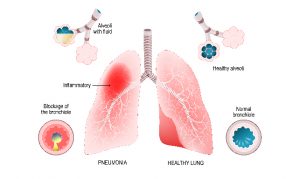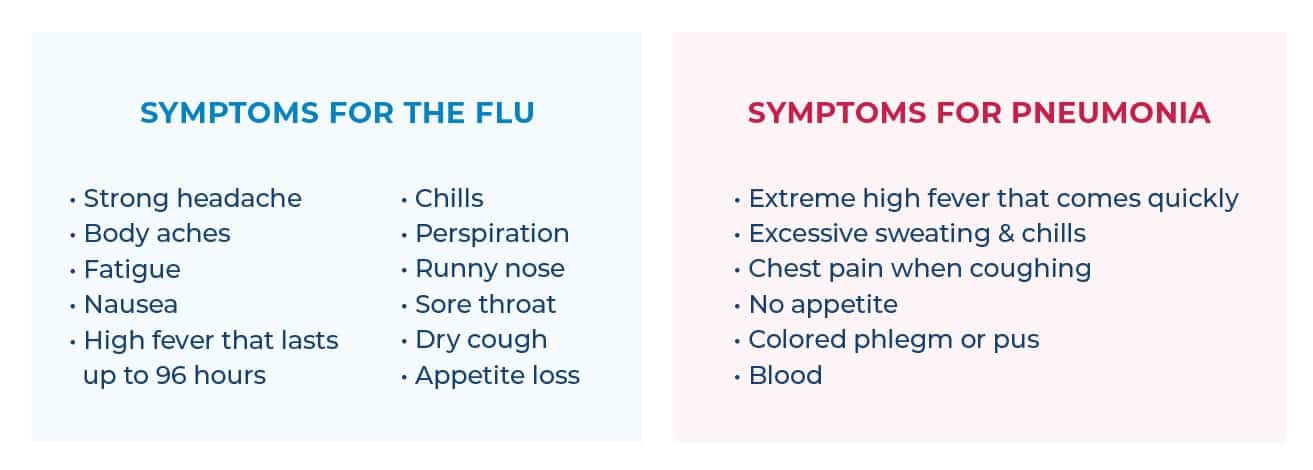Pneumonia is treatable but can become serious if not taken care of in time. Should you go to the ER for Pneumonia? It all depends on your symptoms. More than 250,000 ER visitors are diagnosed with pneumonia. Learn what to look out for and prevention strategies to avoid the illness altogether.
When Should You Go to the ER for Pneumonia?

Before going into a thorough explanation of what pneumonia is, let’s review the symptoms you should look out for that warrants a trip to the ER. If you have any of the following symptoms, seek emergency medical attention immediately.
- Blue lips or fingernails
- High Fever
- Difficulty breathing
- Rapid breathing
- Shortness of breath
- Wheezing
- Lack of energy
- Extreme dizziness
What is Pneumonia?

Pneumonia is an infection that occurs in the lungs due to a bacterial or viral infection. You can get pneumonia at school or at work, this type of pneumonia is commonly known as community-acquired pneumonia. Nurses and doctors are also prone to get pneumonia when treating infected patients, this type is known as healthcare-associated pneumonia. Pneumonia is likely to occur after a cold or the flu due to your weakened immune system.
Common Symptoms of Pneumonia
Symptoms of pneumonia can be mild or severe enough to affect your daily routine. Here is a list of the most common symptoms:
- Cough
- Fever
- Coughing up mucus
- Trouble breathing
- Chills
- Chest pain
Causes of Pneumonia

Bacterial and viral infections are common causes of pneumonia. Not so common causes include inhaling food particles, saliva, liquid, or vomit. The leftover particles can cause infections in your lungs. Fungal infections also lead to pneumonia in people with weak immune systems.
Pneumonia vs Flu
It can become difficult to differentiate the flu and pneumonia due to the fact that they share a lot of the same symptoms.

Related: Strep Throat Symptoms in Kids
Diagnosing Pneumonia

Pneumonia can be hard to diagnose due to the symptoms it shares with the flu. Besides listing your symptoms, your doctor will listen to your lungs with a stethoscope and run blood and mucous tests to determine whether your infection is bacterial or viral. Your doctor can request a chest X-ray that will show where the infection has spread.
Related: What Causes An Upper Respiratory Infection?
Who is at Risk of Developing Pneumonia?

- Adults over 65: It becomes more difficult for older adults to fight infections.
- Children under 5: Pneumonia is the leading cause of child death in the world, killing more than 2,000 children a day due to their underdeveloped immune system.
- Smokers: Smoking causes damage to the lungs and can cause infections.
- Those with weak immune systems: Your body is not strong enough to fight the disease.
How to Prevent Pneumonia

You can prevent pneumonia by also being conscious of preventing the flu. Respiratory illnesses lead to pneumonia so it is wise to prevent that first. You can prevent the flu by getting a flu shot every year. This is especially important during flu season. You never know who may be carrying the flu viruses, Influenza A and B, because carriers don’t always develop symptoms.
It’s also important for adults over the age of 65 to get the pneumococcal vaccine as they are at higher risk of contracting pneumonia and more than 30% still go without it.
You can also prevent the spread of germs by washing your hands. Since pneumonia develops due to a weakened immune system, it’s important to keep it strong by developing healthy habits such as eating fruits and vegetables, exercising, and avoid smoking.
Check with your primary physician to see what steps you need to take to maintain a healthy immune system. Should you need to go to the ER for pneumonia, don’t hesitate. If necessary please call 911 or head to your nearest emergency room.
Further Reading:
